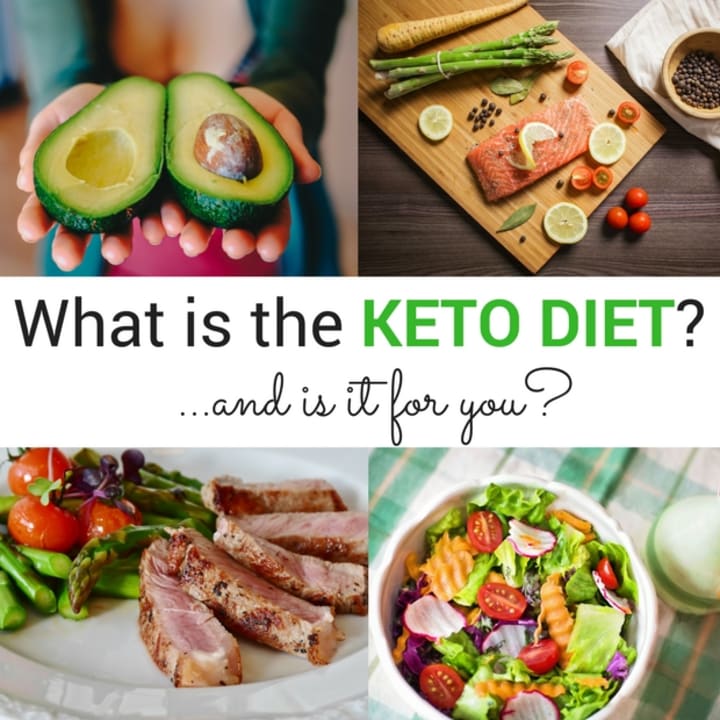Ultimate Benefits of the Ketogenic Diet
Understand the keto diet and all its benefits!

People all around the world are obsessed with this low-carb, high-fat diet, but is this ketogenic lifestyle just another fad?
Below you'll find rather in-depth information to understand just how the keto diet helps you lose weight quickly, boosts brain activity, and keeps you energized and recharged.
You'll learn everything from what to expect and what to consume on a daily basis.
Is it just me, or is it sort of impossible to read about celebrity diets these days without seeing at least a mention of the Ketogenic diet?
Halle Berry said it reversed her type 2 diabetes, Mama June recently shed a ton of weight, and Kourtney Kardashian has sworn by the diet.

What is the ketogenic diet?
Ketogenic diet: A very low-carb diet, which turns the body into a fat-burning machine. It has helped millions of people already with many proven benefits for weight loss, health, and performance.
The keto diet is basically known for being a diet consisting of low carb intake where the body produces ketones in the liver to be used as energy.
It's referred to as variety of names—ketogenic diet, low-carb diet, low-carb high-fat (LCHF), etc.
Whenever someone eats something high in carbs, the body produces glucose and insulin.
"The keto-eating lifestyle is all about minimizing your carbs and upping the fats to get your body to use the fat as a form of energy," says Scott Keatley, R.D. from Medical Nutrition Therapy at Keatley.
Save 20 percent on your first three orders today, by using code: FIRST3.
The Key to a Keto Lifestyle
Everyone who starts following the keto diet notice weight loss for a few reasons: When you eat carbs, your body retains fluid in order to store carbs for energy (you know, in case it needs it). But when you’re not having much in the carb department, you lose what is known as water weight.
After about two to seven days of following this keto lifestyle, you will experience something called ketosis, or the state your body enters when it doesn't have enough carbs for your cells to use for energy.
"Then it naturally starts making ketones, or organic compounds that your body then uses in place of those missing carbs which allows it to burn fat for more energy," says Beth Warren, R.D., founder of Beth Warren Nutrition and author of Living A Real Life With Real Food.
Why the carb restriction? Well, since our body's preferred fuel source is carbohydrates, it will always turn to those first.
So if you eat fewer carbs, the body will burn through them faster, and will have to find an alternative to start breaking down fat for energy. When this method occurs, the body goes into a state of ketosis.
Today, we know the constant incorrect push toward fat-free products actually made us fatter, causing the diet pendulum to swing in the other direction.
With tons of extensive research that has continually shown that weight loss is more effectively achieved through a high-fat, low-carb eating plan, surprisingly health-conscious folks have fully embraced fat.
In recent years, most nutritionists now suggest that their clients incorporate fatty foods like fish, avocado, and olive oil into their diets.

Keto Foods to Eat and Foods to Avoid
Here are some things you should know before going keto:
- It’s important to educate yourself about the potential risks before trying it.
- Keto diet meal plans are pretty restrictive.
- Keto dieters eat mostly meat, healthy fats, and non-starchy vegetables like leafy greens. And... that's pretty much it.
Here's a Breakdown of Keto-friendly Foods:
- Fats: Olive oil, coconut oil, avocado oil, butter, MCT oil, avocados
- Non-starchy vegetables: Leafy greens, cruciferous veggies (broccoli, cauliflower, cabbage, brussels sprouts), cucumbers
- Proteins: Beef, eggs, poultry, fish
Keto Foods to Eat Sparingly:
- Medium-starchy vegetables: Carrots, beets, parsnips, peas, artichokes, potatoes
- Full-fat dairy: Milk, yogurt, cheese
- Nuts and seeds: Almonds, Cashews, walnuts, pumpkin seeds, sunflower seeds
- Fruits: Berries, bananas, melons
- Legumes: Beans, chickpeas, lentils, peanuts
- Processed foods: Anything that comes in a bag or a box
- All types of sugar: Including honey, agave, maple syrup
- Grains: Wheat, oats, all types of rice, corn
- All foods made with flour: Breads, pastas
Despite how many limitations the ketogenic diet contains, diet and nutrition experts claim that with careful planning, you can still fit in all of your vital vitamins and minerals.
Although, to play it safe, you should get a calorie tracker app or work with a nutritionist to come up with a well-rounded keto meal plan.
This company offers 2-day delivery service every day, all day no matter what for: groceries, health items, cosmetics, electronics at up to 60 percent off of the MSRP. I purchased some nutritional boost drinks on a Wednesday and Friday morning they were at my door. It was unbelievable. They really take their "jet" name seriously. Fastest online delivery company I've used without having to pay an arm and a leg for upgraded delivery! I highly recommend you try them before going elsewhere, especially if you're in a crunch for time.
Important Tips to Know
While it's clear that everyone's body and needs are slightly different, that typically translates to: 5-10 percent of your calories coming from carbs, 60-75 percent of your calories from fat, and 15-30 percent of your calories from protein.
The most important factor for reaching ketosis is to being able to avoid eating too many carbs. You’ll most likely need to keep carb intake under 50 grams per day of net carbs, which ideally would be below 20 grams.
Counting carbs can be helpful at first. Keep in mind, the fewer carbs, the more effective.
When participating in a keto lifestyle, there are a few things to avoid: any foods containing a lot of sugar and starch. Yes, this includes starchy foods like rice, bread, pasta, and potatoes. These foods also happen to be very high in carbs.
What can you drink on a keto diet? Water is ultimately the perfect drink, and tea or coffee are fine too.
However, use zero sweeteners, especially not sugar. A rather small amount of milk or cream in your coffee or tea is okay. An occasional glass of wine is fine, too.
When our body produces ketones, it’s known as being in " ketosis." The fastest way to get there besides a keto lifestyle is by fasting or not eating anything, but nobody can fast forever.
For someone who is on a 1,500 calorie diet, that would translate to 19 grams of carbohydrates per day, which equals to less than what you find in one medium-sized apple.
Millions have come on board to reap the benefits of detoxification. Everyone should detox their body at least twice a year, mainly because of the harmful chemicals in our environment, tap water, gas fumes, and the foods we consume on a daily basis that just sit in our esophagus and basically rots for years (causing weight gain or belly pudge). Studies prove that detoxing has cut down by 67 percent on cancer rates across the board, especially colon cancer.
About the Creator
Silena Le Beau
She expresses her gift of writing through each piece. She studied writing in college and has been inspiring people for 20 years. She gives back to the community & enriches them with enlightenment. Philanthropist, Empath and Nature lover.






Comments
There are no comments for this story
Be the first to respond and start the conversation.